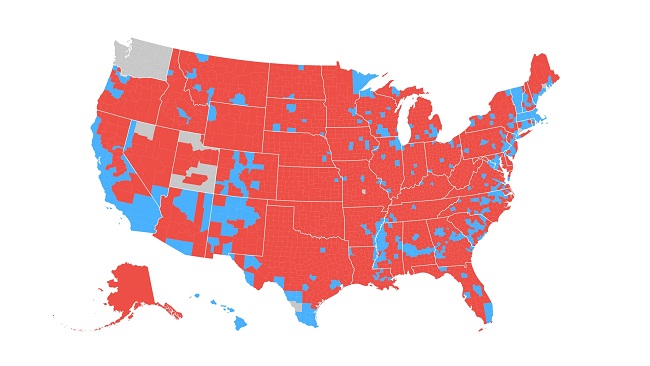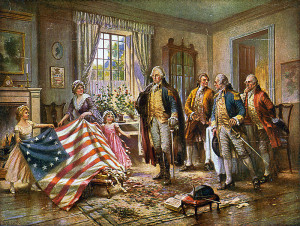Federalism Strikes Back – President Trump and the Road Ahead
Wednesday, January 18, 2017 by Jonathan R. Gibbons in
The 2016 presidential election was historic for a variety of reasons but for students of American Government, it demonstrated the beauty of a well structured Republic that respects a significant division of powers. Crash course in American Government… the people don’t elect the president; the States do. Trump won 30 of 50 States. In a nutshell, this is how the Electoral College works. It is a sound process because the president serves as the leader of the union of all the States and only the people vicariously through such leadership. A popular vote would essentially mean that the president represents only the most populated States, thereby completely alienating 3/4 of the States and making them meaningless.
 The genius of the U.S. Constitutional Framers is that they designed America to be a government of balanced powers both within the federal branches of government, and also between the federal and state governments. Specifically, they sought to deter the tyranny of the majority or one dominant community (e.g., liberal Californians) over the rest of the nation. As nearsighted as many of them were when it came to slavery, sexism, and racism, the essence of their statecraft remains forever effervescent. They sought to constrain the power of the majority and, instead, to empower the super-majority by dividing powers and requiring significant consent to alter the fundamental structures of our country. Moreover, Americans have the rare freedom to move from one government to another– Texas to California –while still remaining Americans with all of their individual rights recognized and codified in the Bill of Rights therein.
The genius of the U.S. Constitutional Framers is that they designed America to be a government of balanced powers both within the federal branches of government, and also between the federal and state governments. Specifically, they sought to deter the tyranny of the majority or one dominant community (e.g., liberal Californians) over the rest of the nation. As nearsighted as many of them were when it came to slavery, sexism, and racism, the essence of their statecraft remains forever effervescent. They sought to constrain the power of the majority and, instead, to empower the super-majority by dividing powers and requiring significant consent to alter the fundamental structures of our country. Moreover, Americans have the rare freedom to move from one government to another– Texas to California –while still remaining Americans with all of their individual rights recognized and codified in the Bill of Rights therein.
President Trump – The Good
Your neighbors and friends voted for Trump not because they are racist or sexist or homophobic, but because they made a calculated decision based on a variety of policies and a rejection of the corrupt establishment. Our union is in critical condition. Obama failed to heal it, and Hillary– along with Bush and others –helped create our critical condition. Trump has voiced support for ending entangling foreign alliances, instituting term limits on Congress, balancing the federal budget, constraining the influence of lobbyists, empowering small businesses, reforming the monopolistic-powers of big pharmacy, auditing the Federal Reserve System, and striking the military-industrial complex at its’ core.
Trump also offers us a great deal of hope in that he is a true capitalist and not a member of the political-corporatist elite. There are no puppets pulling Trump’s strings. Trump is a nationalist; not a globalist. American universities, Hollywood, virtually all American presidents for the past seventy-years, and multi-national corporations, were/are globalists. Nationalists are not always right, but at least they seek to put America first. Globalists just want a one-world government that governs according to their particular worldview.
President Trump – The Bad
Some question Trump’s allegiance and his lack of government experience. On allegiance, rather than looking out for the American people, many worry that he seeks to make himself and his rich friends more wealthy and powerful. They worry that he is using the Office of the Presidency as a tool to obtain more power over natural resources and the lives of everyday people. When it comes to governmental experience, it has been shown that excellent business skills do not necessary equate to good governing skills. Public management is not of the same artistry as business management and many business leaders are not only ineffective, but destructive when they attempt to apply their skills to the tasks of public management.
In my analysis, the one criticism of Trump that all watchful patriots should heed is his unbelievable consistency to act like a petulant child when someone insults him. The under-layer of his skin is more easily penetrated than a desperate prostitute. And so… this is where I grow worried. Trump possesses all the characteristics of an alpha-male short of his weak temperament and his inability to harness the largely false insults thrown towards his precious ego into a powerful arsenal of positive influences. However, one may find some comfort in this narcissistic behavior. Much like President Obama and other U.S. President’s, Trump has a massive ego and he wants to be right. Unlike his predecessors, however, Trump is results-driven which is a direct consequence of his failures within the private sector. Politicians, while egocentric to the extreme, rarely deal with the results of their efforts, whereas highly successful businessmen deal with the consequences of their poor decisions everyday. In short, Trump will seek actual results or witness the failure of his legacy.
The Road Ahead
Overall, most of the hatred thrown towards Trump is likely unwarranted. However, his thin-skin and inability to withstand the onslaught of insults thrown at him could be dangerous in the world of diplomacy. We should still be hopeful. Our country is severely crippled in mountains of debt and has been suffocating under the power of a corrupt establishment. President Trump offers us a new direction. The moment he fights for Congressional term limits, auditing the Federal Reserve System, and balancing the federal budget, we’ll know he’s on our side. To my black, liberal, female, and gay friends, you may rest easy and trust in the balance of powers that constrain tyranny and protect our Bill of Rights. Trump has never vehemently expressed a desire to destroy those rights. The moment he does, he’ll lose his support and be gone in 2020 if not earlier through impeachment. More importantly, there’s no candidate more dangerous than the idea that our president is some sort of king who can solve every problem, or the continual inaction of Americans not voting out the scum that occupies Congress in every non-presidential election.
Political Gridlock, Planned Parenthood and 911
Saturday, September 26, 2015 by Jonathan R. Gibbons inPundits, citizens, government officials, and the like, often complain that Congress is gridlocked, polarized, and simply cannot get anything done. Many complain that the government and the Congress are broken beyond repair. This is always perceived to be some sort of defect or malfunction. President Obama discusses political gridlock in the video below.
Foreigners even laugh at our legal stagnation and Americans take offense. This is because foreigners, President Obama, and many Americans, have the wrong concept of how our federal government is supposed to function. America is not a pure democracy like many other western states; it is not a simple majority rules system. We are a super-majority ruled system as manifest in the vast percentage of consent required to amend the U.S. Constitution, to override a presidential veto, and as evident in the balancing of powers between the States and federal government (i.e. federalism). Said otherwise, while the rest of the world seeks 51% approval of its’ people, we aim higher and divide powers between different levels of government. Legal stagnation and political gridlock is, then, a precise example of our federal government functioning as intended. It prevents tyranny and the legal dominance by a simple majority.
When the Congress is at a standstill over a controversial issue, that is a very good thing. It means the country is truly divided and that stagnation is important to prevent a simple majority from foisting their views onto the entire nation. Funding Planned Parenthood (PP) while they continue to provide abortions and sell fetus organs and limbs isn’t something that a super majority of the country supports. That doesn’t mean most don’t support funding for the plethora of other important services PP provides, but– whether you are for or against abortion –it is asinine for a huge majority of the population strongly opposed to abortion to be forced to fund PP without a tough fight. The Hyde Amendment is supposed to prevent PP from using federal funds for abortions, but this is smoke and mirrors legal manipulation. If I give a drug addict $20 and tell them to only spend it on food, what do you think they’ll do with whatever other money they have? Funding PP is aiding and abetting all of what they do. If PP wants federal funding they should stop performing abortions and selling fetus parts. In short, agree or disagree with the points I made here, the PP issue is a controversial problem that has created genuine cause for legal stagnation.
Conversely, when the United States was attacked on September 11, 2001, the overwhelming majority of Americans and the Congress were in unison. Nearly 90% of Americans supported the use of force to bring the culprits to justice (American Enterprise Institute 2008, 61). Congress passed legislation to essentially declare war within weeks after 911. Even the most anti-war representatives, including former Congressman Ron Paul, voted for the legislation. Some issues are cut and dry and are so obviously supported by the overwhelming majority of Americans that Congress is swift and effective. Other controversial issues, such as Universal Healthcare, Corporate Bailouts, and funding for PP, are properly within the realm of political gridlock.
In sum, the genius of the American Framers is that they designed America to be a government of balanced powers both within the federal branches of government, and also between the federal and state governments, in order to resist tyranny. Legislation is slow and often stagnant in America by design, not by accident or malfunction (Jacobson 2013, 689). Political gridlock is a good thing; it’s our republic’s built-in safety mechanism to constrain the tyranny of the many.
(more…)
The Decline of American Federalism
Friday, August 15, 2014 by Jonathan R. Gibbons inIntroduction: The Unique American System of Government
On October 18, 1787, New York Judge Robert Yates, writing under the pseudonym of Brutus (Ketcham 2003, 269), wrote the following in his first essay arguing against ratification of the United States Constitution (USC, Constitution) drafted at the Constitutional Convention of 1787 (CC):
History furnishes no example of a free republic, anything like the extent of the United States. The Grecian republics were of small extent; so also was that of the Romans. Both of these, it is true, in process of time, extended their conquests over large territories of country; and the consequence was, that their governments were changed from that of free governments to those of the most tyrannical that ever existed in the world. (Ketcham 2003, 276)
Yates invokes Montesquieu– a beloved and inspirational political philosopher of many of the Framers –in arguing that a republic is best when it is small in both geography and population. When writing his essay, Yates pointed out that the United States (U.S., America) contained just shy of three million people which were to be inappropriately represented by the new federal government. He held profound concerns of inappropriate representation at the federal level as a result of population growth. These concerns were not only justified, but in fact underwhelming compared to the current lack of federal representation. According to his figure, at the cusp of the ratification of the USC, one federal representative represented less than 30,000 citizens, whereas today one federal representative represents over 700,000 citizens. Stated differently, if U.S. citizens had the same federal representation in the U.S. House of Representatives (House) today, as they did in 1789, there would by approximately 10,000 representatives in the House. The famous American revolutionary exclamation that there should be, “no taxation without representation,” should penetrate the conscience of all watchful patriots when contemplating this reality. This is yet, only one concerning prediction that Yates and others (Ketcham 2003, 319) held, which indeed came to fruition. It’s paramount that we revisit the debates had between CC delegates to better understand the purpose of the federal government and the decline of federalism.
The genius of the Framers is that they designed America to be a government of balanced powers both within the federal branches of government, and also between the federal and state governments, in order to resist tyranny. Legislation is slow and often stagnant in America by design, not by accident or malfunction (Jacobson 2013, 689). Stagnation is part of the design which prevents the dominance by a majority and/or dominance by a single sovereign. As Abigail R. Moncrieff quips, “Congress can regulate more quickly and efficiently than the states. There is someone who can regulate more quickly and efficiently than Congress, too: King George III. The benefit of diffusing regulatory power is that it checks against governmental abuse and tyranny” (Moncrieff 2012, 303). Moreover, despite the lack of federal representation and the decline of federalism, America has not become a dictatorship because of both the Bill of Rights (BOR), and the very checks within the federal government which are also supposed to exist between the federal government and the states as well. This system of federalism, which protects liberty, provides the crux of this paper’s theme, the author’s assimilation of political science studies, and the core thesis posited in the final sentence of the next paragraph.
(more…)





























